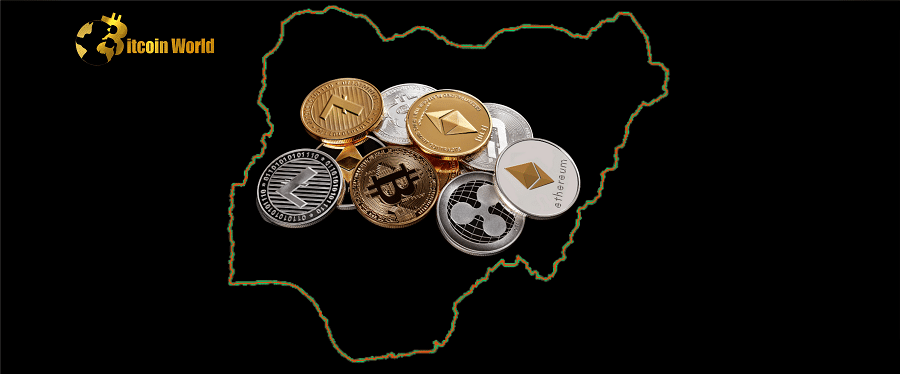Imagine standing in long bank queues, ATMs running dry, and the money in your pocket suddenly becoming outdated. This isn’t a scene from a dystopian movie, but the reality for many Nigerians right now. As Africa’s most populous nation grapples with a chaotic currency redesign, a digital alternative is gaining traction: Bitcoin.
Why are Nigerians Turning to Bitcoin Amidst Currency Redesign?
Nigeria, a vibrant nation of over 200 million people, is currently leading global Google searches for ‘purchase Bitcoin’. This surge of interest comes at a critical time, just weeks before the country’s highly anticipated elections. But what’s driving this sudden crypto craze?
Let’s break down the situation:
- The Naira Redesign Policy: In October 2022, the Central Bank of Nigeria (CBN) announced a redesign of the Nigerian Naira. Citizens were given a tight deadline to exchange old notes for new ones.
- The Looming Deadline & The Shortage: The initial deadline of January 2023 created a rush to banks. However, the new notes were scarce, leaving many Nigerians unable to swap their old currency.
- Frustration and Public Outcry: Nigerians have voiced their frustration across social media platforms, highlighting the long queues, non-functional ATMs dispensing old notes, and the overall disruption to daily life.
This situation has created a perfect storm, pushing many Nigerians towards exploring alternative financial solutions, with Bitcoin emerging as a frontrunner.
The Bitcoin Connection: A Lifeline in Times of Fiat Uncertainty?
So, why Bitcoin? In times of economic uncertainty and fiat currency instability, cryptocurrencies like Bitcoin can offer several potential advantages:
- Decentralization: Bitcoin operates outside the control of central banks and governments. This can be appealing when trust in traditional financial institutions is wavering.
- Scarcity: Unlike fiat currencies which can be printed at will, Bitcoin has a capped supply of 21 million coins. This inherent scarcity can act as a hedge against inflation.
- Accessibility: In theory, accessing Bitcoin is possible with just a smartphone and internet connection, potentially bypassing the need for traditional banking infrastructure, which is proving strained in Nigeria right now.
- Potential Store of Value: Some view Bitcoin as a store of value, similar to gold, especially in regions experiencing high inflation or currency devaluation.
Is Bitcoin the Solution to Nigeria’s Currency Woes?
While Bitcoin offers potential benefits, it’s crucial to acknowledge the complexities and challenges:
| Aspect | Bitcoin in Nigeria’s Current Context |
|---|---|
| Volatility | Bitcoin’s price is known for its volatility. While it can offer potential gains, it also carries the risk of significant losses. |
| Adoption Hurdles | Widespread Bitcoin adoption requires education, internet access, and overcoming technological barriers for a large segment of the Nigerian population. |
| Regulatory Landscape | The regulatory environment for cryptocurrencies in Nigeria is still evolving. Government policies can significantly impact the usability and legality of Bitcoin. |
| Transaction Fees & Speed | Bitcoin transaction fees and processing times can fluctuate, potentially posing challenges for everyday transactions, especially in a fast-paced economic environment. |
Voices from Nigeria: Politicians and the People
The currency redesign saga has sparked reactions from prominent Nigerian figures. Former presidential candidate Kingsley Moghalu highlighted the dilemma on Twitter:
“It seems the Naira redesign strategy has become a fight over banning vote-buying politicians vs regular folks being allowed to go on normal lives with legal tender currency. Stopping vote buying may cause individuals to suffer, according to some. This is a genuinely challenging position. Nigeria! ”
His statement reflects the complex political and economic undercurrents at play. The policy, intended to curb vote buying, is inadvertently impacting ordinary citizens.
Another presidential contender, Alhaji Atiku Abubakar, also voiced concerns, urging the central bank to extend the deadline, especially for those in the unbanked sector and craftsmen who rely on cash transactions. While the CBN did extend the deadline by ten days, the underlying issues of scarcity and public frustration persist.
Fiat Shortage, Inflation, or Both? The Crypto Question Remains
The Nigeria Presidency, through its official Twitter account, acknowledges the rising interest in cryptocurrency but the exact reasons remain somewhat speculative. Is it purely a reaction to the fiat currency shortage, or is it a deeper response to rapid inflation eroding the value of the Naira? Perhaps it’s a combination of both.
What’s Next for Nigeria and Bitcoin?
The coming weeks will be crucial in observing how this situation unfolds. Will the Nigerian government take further steps to address the currency shortage? Will Bitcoin adoption continue to surge? Here are some potential scenarios:
- Increased Crypto Education: The current crisis might spur greater interest in understanding cryptocurrencies and their potential benefits and risks.
- Regulatory Clarity: The Nigerian government may be compelled to develop clearer regulations for the cryptocurrency space to manage its growth and mitigate potential risks.
- Digital Naira Push: This situation could accelerate the adoption of Nigeria’s own central bank digital currency (CBDC), the eNaira, as a government-backed digital alternative.
Conclusion: Nigeria’s Crypto Crossroads
Nigeria’s current economic climate, fueled by currency redesign chaos, is undeniably pushing its citizens to explore alternative financial avenues. Bitcoin, with its decentralized nature and potential as a hedge against fiat instability, is emerging as a compelling option for many. Whether this is a short-term reaction to a crisis or the beginning of a more profound shift towards cryptocurrency adoption in Nigeria remains to be seen. One thing is certain: Nigeria’s experience is a powerful case study in how economic pressures can accelerate the adoption of digital currencies and reshape the financial landscape. Keep watching this space – the story of Bitcoin in Nigeria is just getting started.
Disclaimer: The information provided is not trading advice, Bitcoinworld.co.in holds no liability for any investments made based on the information provided on this page. We strongly recommend independent research and/or consultation with a qualified professional before making any investment decisions.


